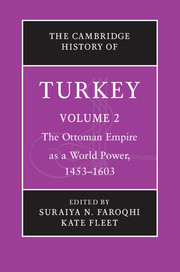Book contents
- Frontmatter
- Contents
- List of Illustrations
- List of Maps
- List of Contributors
- Chronology
- A note on transliteration
- Maps
- 1 Introduction
- Part I An Expanding Empire
- Part II Government, Economic Life and Society
- 7 Government, administration and law
- 8 The Ottoman government and economic life
- 9 Ottoman armies and warfare, 1453–1603
- 10 Religious institutions, policies and lives
- 11 Ottoman population
- Part III Culture and the Arts
- Glossary
- Bibliography
- Index
- References
10 - Religious institutions, policies and lives
from Part II - Government, Economic Life and Society
Published online by Cambridge University Press: 05 July 2013
- Frontmatter
- Contents
- List of Illustrations
- List of Maps
- List of Contributors
- Chronology
- A note on transliteration
- Maps
- 1 Introduction
- Part I An Expanding Empire
- Part II Government, Economic Life and Society
- 7 Government, administration and law
- 8 The Ottoman government and economic life
- 9 Ottoman armies and warfare, 1453–1603
- 10 Religious institutions, policies and lives
- 11 Ottoman population
- Part III Culture and the Arts
- Glossary
- Bibliography
- Index
- References
Summary
The world of the scholar-officials (ulema)
From its very beginnings, the Ottoman Empire was an Islamic polity through and through. Early on, the lords (beys) of this dynasty, who soon laid claim to the title of sultan, adopted the fundamental institutions of an Islamic principality, such as the kadı’s court, the mosque and its personnel, the allocution at Friday prayers in which the preacher proclaimed the name of the legitimate ruler, the theological college (medrese) and the fundamental institution of the pious foundation. Yet, at the same time, everyday realities were more complex, for Sunni Islam was not the religion of the population in its entirety.
Nor were there in this early period many religious cum legal scholars (ulema) who had received their training locally; rather, such people had to be brought in from other places, including those Anatolian principalities where Islam had struck deeper roots or else from the Near East or Central Asia. Very often, these “imported” doctors of the faith were both scholars and mystics, with one or the other identity predominating; according to the terminology used by Taşköprüzade, biographer of numerous early Ottoman religious cum legal scholars, they were mevlas, adherents of the Hanefi school of law, and/or dervish masters or şeyhs. Moreover, among the early beys and their companions, formal Sunni Islam co-existed with beliefs and practices derived from different worlds: shamanism and other religions practiced by the Turkic peoples before adopting Islam had left tangible traces, and the same thing can be said of the antinomian and esoteric tendencies characterising the Malamatiyya/Melametiyye style of mysticism. Shi‘ite tendencies also flourished in this milieu, and presumably other types of religious practices that our scanty sources do not permit us to identify.
- Type
- Chapter
- Information
- The Cambridge History of Turkey , pp. 320 - 355Publisher: Cambridge University PressPrint publication year: 2012



